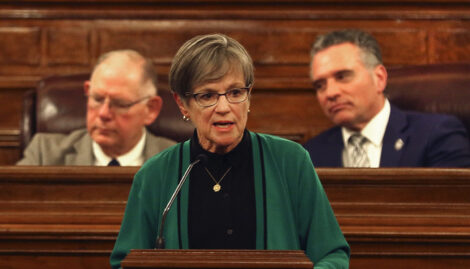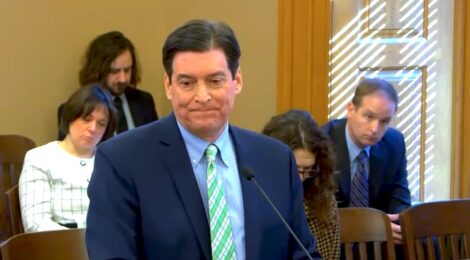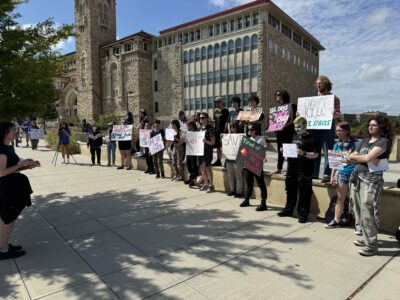Wrongfully Convicted: He spent 10 years in prison for a rape he didn’t commit; now he’s getting $7.5M
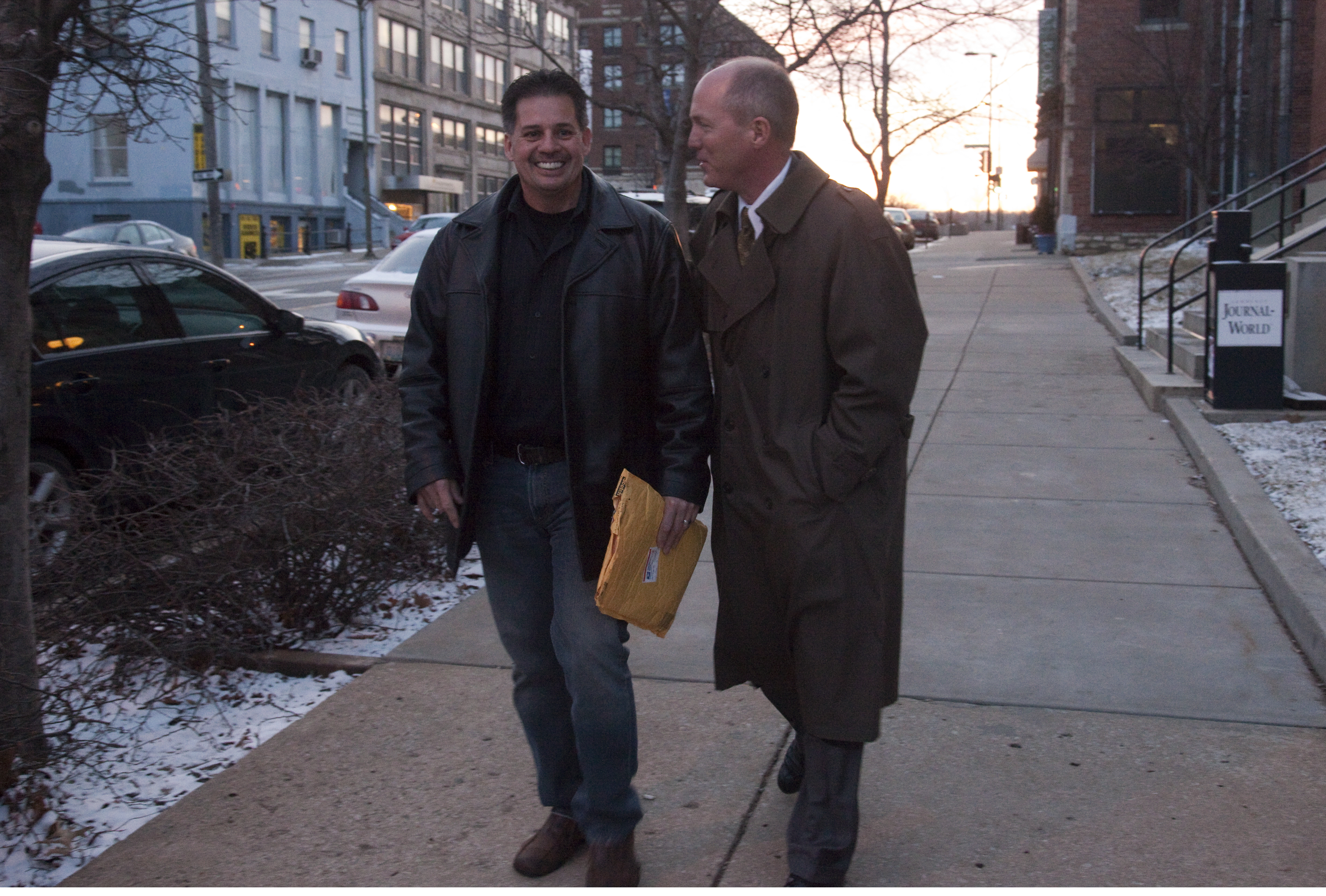
Eddie Lowery, left, walks with his attorney Barry Clark on Seventh Street. Lowery was wrongfully convicted of a rape in the 1980s while he was a soldier at Fort Riley. Decades later, DNA evidence showed he did not commit the crime.
Over the past 30 years, Eddie Lowery has been a soldier, a convicted rapist, an ex-convict, a registered sex offender, a husband and a father.
But Lowery, 50, is also an exonerated man who spent 10 years in a Kansas prison for a rape he didn’t commit.
After nearly three decades, Lowery’s struggle with the criminal justice system is almost complete.
“I feel now that justice is coming full circle,” he said in a recent interview.
Lowery has reached a $7.5 million settlement with the Riley County officials who worked to wrongfully convict him. And, last week, officials in the Kansas attorney general’s office announced they had arrested the man they believe actually committed the crime.
“Who could ever imagine a story like this?” Lowery said.
It’s a story that began in 1981 when Lowery, a U.S. Army soldier stationed at Fort Riley, hit a parked car while on his way to the store. Lowery spoke with police, detailing the accident.
“I thought that’d pretty much be the end of it,” said Lowery, who at the time was married with a 3-year-old daughter.
But when he went to the station the next day, police began questioning him about the rape of an elderly Ogden woman that had occurred near the accident.
“It was very disturbing to me,” he said. “How could anyone even think I could be part of this crime.”
Lowery denied involvement, but the next day, police brought him back in for more questioning.
“I thought I’d tell them what happened and they’d believe me and I’d go back to my normal life,” Lowery said.
But police didn’t believe him, and the questioning became more heated, as police denied him an attorney and the opportunity to make any phone calls.
Lowery took a lie detector test.
“I wanted to clear my name. I wanted to help,” he said.
Police told him he failed the lie detector test. “They started coming down on me real hard,” Lowery said. “They just continued to hammer me and threaten me.”
After hours of questioning, Lowery said he simply broke down.
“I was totally mentally exhausted,” he said. “I didn’t know how to get out of the situation.”
Police began giving Lowery facts of the case, and Lowery repeated them back. The interview was not recorded, but police said they had a “confession.”
“I beat myself up for years for giving them a false confession,” Lowery said. “They had no other evidence. … Because I wasn’t there.”
Lowery was tried based solely on that confession. His first trial resulted in a hung jury, but during the second trial the jury convicted him of rape, aggravated battery and aggravated assault.
“When they came in and read the guilty verdict, I was stunned,” Lowery said.
Prison
At age 22, Lowery received a sentence of 11 years to life and was sent to Lansing Correctional Facility.
“I thought I’d be in prison forever,” he said.
After six years at Lansing, he was transferred to minimum security and began thinking about the possibility of being released.
He played on prison softball teams and ran 10K races through the streets of Lansing.
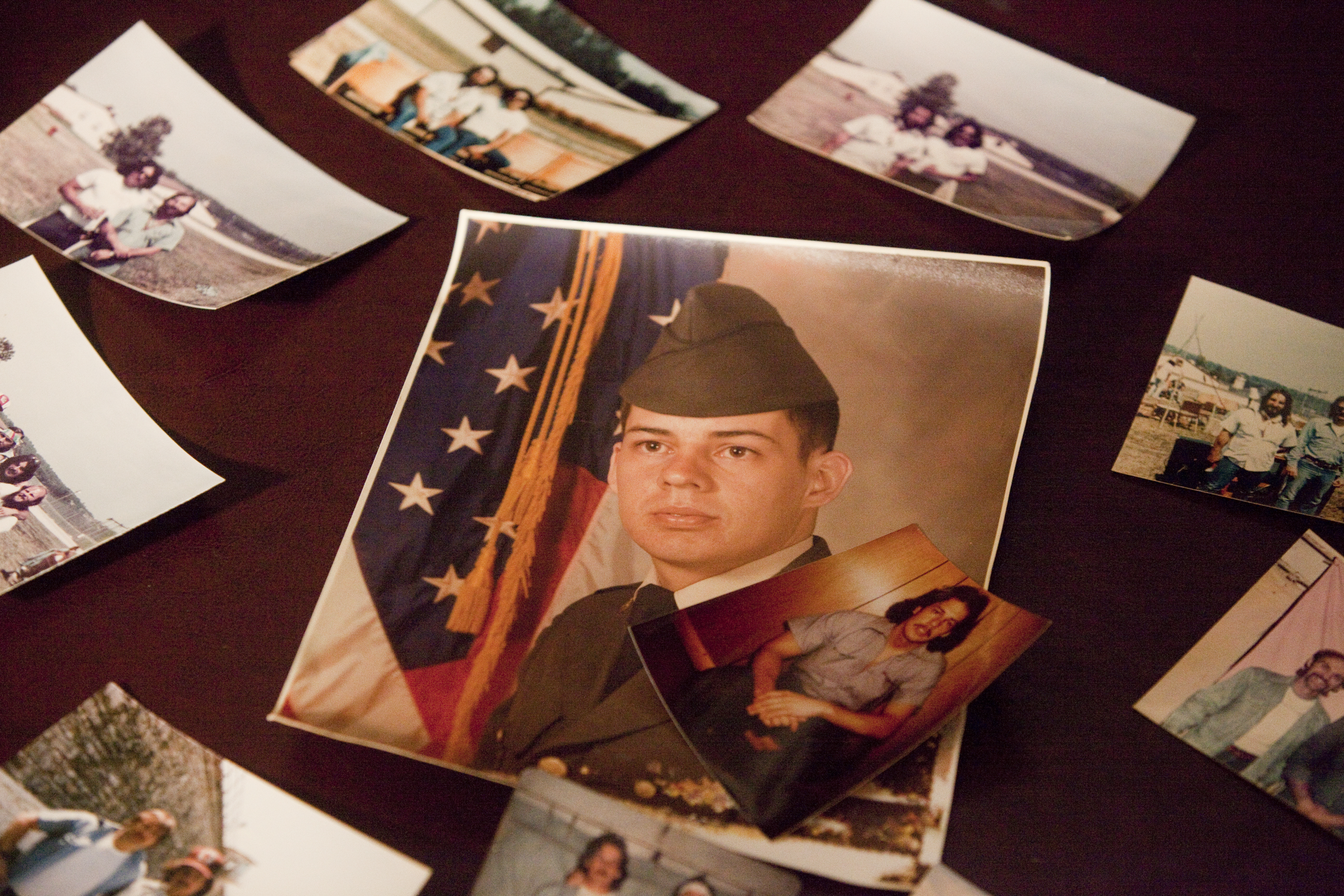
A 19 year old Eddie Lowery in his Military garb, and a photo of him with long hair. He spent 10 years in prison for a rape that he didn't commit.
“That made me realize how much I was missing my family,” said Lowery, who didn’t see his daughter while in prison.
Three times, Lowery came before the parole board, and each time he denied involvement in the rape. With the years passing him by, Lowery said he was finally prepared to tell the review board he committed the crime.
Lowery completed a required sex offender course, where he had to lie about being a rapist.
“Basically, I lied to go to prison and I had to lie to get out of prison,” said Lowery, who was paroled in 1991.
After his release, Lowery started patching his life back together. He moved to Kansas City, Mo., remarried, had two children, and got a job working at Ford. But in 1994, he received a letter informing him that because of a new law, he’d be required to register as a sex offender.
“I assumed everyone would find out. It just put me in a deep depression. It was a humiliating time in my life,” Lowery said.
A few years later, Lowery began hearing about how DNA testing was helping exonerate the wrongfully convicted.
“I knew I could prove my innocence,” said Lowery, who started a six-year quest to find a lawyer to assist him. Lowery was referred to Manhattan, Kan., attorney Barry Clark. With the assistance of the New York-based Innocence Project, Clark helped locate the original rape kit, which was still in an envelope in the Riley County records vault.
“You could have knocked me over with a feather,” said Clark, who was doubtful they’d find the evidence after more than 20 years. “I thought, ‘This is providence.'”
Lowery described finding out about the kit as one of the most emotional moments of his life.
“When he (Clark) told me that they found the rape kit, I knew that I was going to be found innocent of this crime,” Lowery said.
In 2003, the kit was sent to a private DNA testing firm, where the results showed Lowery couldn’t have committed the rape. Lowery’s record was expunged and he received apologies from Riley County officials. However, to this day, Lowery said the detectives who pressured him into a false confession have never expressed remorse to him.
“I don’t think the detectives will ever apologize,” he said.
Surviving
Lowery credits his faith with helping him get through the tough years in prison and the struggle of proving his innocence.
“I know that prayers are answered. God has taught me patience,” he said.
And Lowery’s final prayer, that the real perpetrator is caught, also may have been answered.
Last week, Riley County officials and the Kansas attorney general’s office announced the arrest of New York resident Daniel Brewer, 55. Brewer will be extradited to Kansas, where he’ll be charged with two rapes, according to a spokesperson for the attorney general. Few details have been released about the circumstances of the arrest.

Eddie Lowery, who was convicted of rape and spend 10 years in Lansing, talks about his life in prison and the DNA testing that set him free. Lowery has just settled with the State of Kansas for a little over 7 million dollars.
Brewer had been charged with another rape in Kansas in 1981. The case ended with a mistrial. Officials claim Brewer committed the crime Lowery was convicted of a month after the mistrial.
“I prayed for a long time that everything would work out,” Lowery said. “It’s taken a long time, but everything’s worked out perfectly.”
But the years in prison have taken their toll on his relationships with some family members, and to this day trust is difficult for him. Since getting out of prison, Lowery keeps the receipts when he goes to the store so he can always prove his whereabouts.
“I know it sounds kind of crazy, but after you’ve been through something I’ve been through, it doesn’t sound as crazy,” he said.
Lowery is only months away from receiving his $7.5 million settlement, or roughly $2,000 for every day he spent incarcerated. He describes himself as a shy, lifelong blue collar worker and said it will take time to get used to having that amount of money. Some of it will go to pay for college for his son, Joey, who graduates from high school in May, and later for his daughter, Brooke, a high school sophomore. Lowery said he’s grateful the settlement money will help him take care of his family, but no amount of money can ever compensate him.
“Justice would have been never having to go through this,” he said.
Despite the years lost, Lowery isn’t bitter or angry about what happened to him, said Nick Brustin, the New York-based attorney who spent seven years working with Lowery on the civil case.
“He has this inner calm despite what he’s been through,” Brustin said. “He’s an amazing guy.”
Lowery said he will continue to speak out about wrongful convictions, something he has been doing for years in conjunction with the Innocence Project. By telling his story, he said, he hopes to educate those in the criminal justice system.
“It happened to me and it could happen to anyone,” said Lowery, who urges people to be aware of their rights.
Lowery said he isn’t sure what he plans to do with the rest of his life, but he’s looking forward to focusing on his family and working to repair his relationship with the daughter, who is now 29, that he wasn’t able to see grow up.
“I’d just like to take a little vacation and relax and think about my future,” he said.


